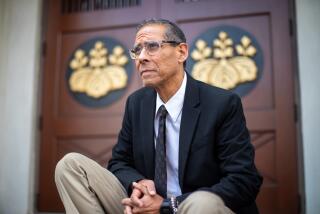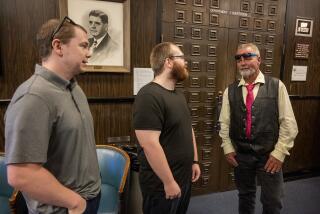Woman freed after serving 32 years in 1981 killing
Mary Virginia Jones, 74, who was serving life without parole for her role in a 1981 murder, was freed from prison late Monday.
Jones walked out of Century Regional Detention Facility in Lynwood around 11 p.m. to big hugs from family and friends, who shared tears and laughter.
Patricia Elder, who calls Jones her “spiritual mother” because of her guidance during their time in prison together, hugged Jones tightly, as others discussed plans for meals and church services.
MORE: The story of ‘Mother Mary’
Earlier Monday, Judge William C. Ryan ordered Jones to be released after USC Law School’s Post-Conviction Justice Project argued that Jones’ abusive boyfriend had forced her at gunpoint to help rob and shoot two drug dealers, one of whom died.
Jones expected to be shot and killed and the subsequent trials did not take into account her history as a battered victim, said the justice project’s directing attorney, Heidi Rummel.
Rummel oversaw USC law students Laura Donaldson and Mark Fahey who managed the case. Spurred by their work, the Los Angeles County district attorney’s office conducted an independent investigation that led to an agreement to dismiss Jones’ previous convictions. She would have to plead no contest to involuntary manslaughter, but would serve no more time or be on probation.
For Jones’ son Robert, who was not allowed to visit the California Institution for Women because of a felony record, it was the first time he had seen his mother in 30 years.
“Ahh, thank you, Jesus! Hallelujah!” shouted one woman who began to sob after the judge issued his ruling.
Jones, using a magnifying glass to help her see, read her plea in court Monday: “I did not willingly participate in this crime, but I believe entering a no contest plea is in my best interest to get out of custody.”
Rummel said the win came after a difficult road. “I’m more excited than I’ve been in a long time. We worked so hard on it and Mary’s such an extraordinary woman. We got a reasonable D.A. who was willing to do the right thing.”
Deputy Dist. Atty. Hyman Sisman said he would not comment on the investigation except to say “justice was done.”
Jones was 41 when she was introduced to Mose Willis, a man who had been convicted of manslaughter, possession of a firearm and evading arrest, according to court documents.
By then, she had already endured physically and emotionally abusive relationships with men, as well as with her mother and father. When she was young, she was raped by a stranger and bore a son. Later, her 4-year-old daughter was killed when she was nearly decapitated by a drunk driver.
Her relationship with Willis was turbulent. Within a month of meeting through a friend, he moved into the home she owned in South Los Angeles. Once, after an argument, he shot at Jones and her daughter and threatened to kill both of them if they talked to authorities.
On April 3, 1981, Jones’ attorneys said, she came home from her job as an L.A. Unified teacher’s aide to find that Willis wanted to use her tax refund check to buy cocaine for resale. Two men were invited over and Willis ordered everyone at gunpoint into a car. When they arrived at an alley, Jones heard a gunshot when her back was turned. She heard another shot as she ran away. She stayed with a friend until her arrest.
Prosecutors argued that Jones was in love with Willis and would have done anything for him. At her first trial, she was convicted of first-degree murder, kidnapping to commit robbery and robbery. The convictions were overturned on appeal.
The jury deadlocked on all counts at the second trial.
The jury for the third trial convicted her only on the two counts of robbery. She was sentenced to 15 years to life.
But the state wanted to retry her yet again. In 1987, Jones was convicted on the remaining first-degree murder count. Willis would die the next year on death row.
Jones soon emerged as a leader and voice of hope for the incarcerated.
“She showed us how to walk the walk with God and be faithful,” said Elder, 55, who served 11 1/2 years and was released in 2001. “She had a light that just shined.”
Denitra Jones-Goodie, 53, said her mother always believed that some day she would be released. “She’s got strength on top of strength,” she said.
More to Read
Sign up for Essential California
The most important California stories and recommendations in your inbox every morning.
You may occasionally receive promotional content from the Los Angeles Times.












